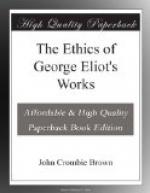Soon follows the scene where her timid offer of humble service is thrown back with all the irritation of that absorbing egoism which is the very essence and life-in-death of the man. For the first and only time, a faint cry of conscious irritation escapes her, followed by an anguish of repentance so deep, so meekly, humbly self-accusing, it reveals to us more of her truest and innermost life than pages of elaborate description could do. A single sentence descriptive of her mood even in that first irritation brings before us her deepest soul, and the utter absence of self isolation and self-insistence there:—“However just her indignation might be, her ideal was not to claim justice, but to give tenderness.”
She meets Ladislaw; and he more than hints to her that the dim, vague labours and accumulations of years which have constituted her husband’s nearest approach to life have been labour in vain; that the “great mind” has been toiling, with feeble uncertain steps, in a path which has already been trodden into firmness and completeness; toiling in wilful and obdurate ignorance that other and abler natures have more than anticipated all he has been painfully and abortively labouring to accomplish. Again a cry bursts from the wounded heart, seemingly of anger against her informant, really of anguish—anguish, not for her own sinking hopes, but for the burden of disappointment and failure which she instinctively perceives must, sooner or later, fall on the husband who is thus throwing away life in vain.
So it goes on, through all the ever-darkening problem of her married, yet unmated, life. Effort, always more earnest on the part of her yearning, unselfish tenderness, to establish true relations between them; to find in him something of that sweet support, that expansive and elevating force, silently entering into her own innermost life, which her first childlike trust inspired; to become to him, even if no more may be, that to which her childlike humility at first alone aspired—eyes to his weakness, and strength and freedom to his pen. So it goes on; ever-gnawing pain and anguish, as all her yearning love and pity is thrown back, and that dulled insensate heart and all-absorbing egoism can find only irritation in her timid attempts at sympathy, only dread of detection




